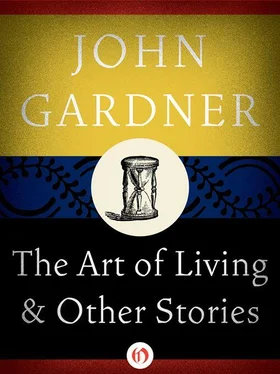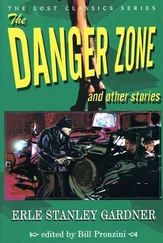“Here now,” Uncle Ed said. “Katy, get this boy a cookie!” And then: “Go on, now. Away with you both!”
I went with her, looking over my shoulder at Uncle Charley, gray-faced on the couch, the doctor in his black suit bending down beside him. They were all smiling now, even Uncle Charley, all of them describing what had happened as “a tumble”—or all except my grandmother, who always took, according to my father, the darkest possible view of things. My mother and father had a fight that night, when they thought I was asleep. My father said my grandmother was an Angel of Death. (His anger may have made him unusually poetic — though now that I think of it, he said the phrase as if he’d used it against her many times.) “If you hate her so,” my mother said, “why don’t you just send her to the old folks’ home?” Thus my mother won, as she always did. When it was clear to them both that she’d won, she said, “Oh, Bill, she’s just worried. You know that. She’s like a child.” I lay in the darkness with my eyes open, trying to make sense of the queer idea.
It wasn’t until the following summer that my family visited Remsen again. Letters passed back and forth two or three a week in the meantime, Aunt Kate telling us of, among other things, Uncle Charley’s gradual recovery — not as quick as it should be, she let us know — my mother sending back our family’s encouragement and sometimes inspirational poems from my grandmother’s magazines. When we finally went to visit it was partly because a Cymanfa Ganu — a singing festival — was to be held nearby, in Utica. At Uncle Ed’s I learned to my surprise and dismay — since I disliked change, hated to see any slightest hint that the universe might not be orderly to the core, as smooth in its operations as an immense old mill — that my uncles and aunt, though they’d never before shown much interest in such things, were planning to go to the festival with my parents and grandmother. I learned it by eavesdropping. When I was supposed to be asleep — as Uncle Charley was, down in his basement room, snoring with his mouth open (I’d sneaked down earlier and seen him there, lying with one arm hanging over the bedside) — I crept without a sound down the front-hallway stairs and settled near the bottom to listen to the voices in the livingroom, just to my left.
Aunt Kate was saying, speaking more softly than usual, “He could do with the lift.”
“He’s still down, isn’t he,” my mother said.
“Oh, Cholly’ll be fine,” Uncle Ed said, hearty as ever, and gave a laugh.
I listened, uneasy, for what my grandmother would say. When she said nothing, I let myself believe she’d fallen asleep over her sewing.
“He keeps in too much, that’s all,” Aunt Kate said, as if shyly, embarrassed that Uncle Ed hadn’t agreed with her.
“So anyway, we’ll all go,” my father said, settling things. “Take Buddy too. He’s never been to a Cymanfa Ganu yet. High time he went!”
“Heavens to Betsy!” my grandmother burst out. “You’d let that poor whippersnapper stay out till midnight with a bunch of wild lunatics howling their miserable heads off?”
A shiver went up my back. I was much too literal-minded a child to fit her description with any kind of singing I’d ever heard of, much less any I’d been in on. I remembered stories my uncle Ed had told me of how the Welsh were all witches in olden times — how they used to fly around like birds at night, and make magic circles among trees and stones.
The following day I was so filled with anxious anticipation I could hardly breathe. Out in the mill I kept close to Uncle Charley, trying to guess every move he was about to make and help with it. He seemed smaller all over, since the accident. Though he wore arm-elastics, his cuffs hung low, as did the crotch of his overalls. His hands trembled, and he no longer bothered to put his teeth in. In the past he’d pretended to appreciate my help. Now, as I gradually made out, it annoyed him. “I’ll get that,” he’d say, kicking a twine-bale from the aisle as I reached for it. Or as I ran to push a heavy door open further, he’d say, “Leave it be, boy. It’s open far enough.” In the end I did nothing for him, simply stayed with him because I was ashamed to leave him and go look for Uncle Ed.
He no longer did the kinds of work he’d done before. The hundred-pound sacks were too heavy for him — he wasn’t much heavier than the sacks himself — and when he pushed the feedtruck, after Uncle Ed had loaded it, both Uncle Ed and I would watch him in distress, afraid it would tilt too far back, off balance, and fall on him. Mostly, Uncle Ed had taken over the pushing of the feedtruck. “Go ahead, then,” Uncle Charley said crossly. “It’s your mill.” To keep busy, Uncle Charley set rat traps, wound wire around old ladder rungs, swiped down cobwebs, swept the floors. He still joked with farmers, as he’d always done, but it seemed to me the lightness was gone from his voice, and his eyes had a mean look, as if he didn’t really think the jokes were funny or the farmers his friends. Sometimes in the office, when the farmers were alone with Uncle Ed and me, one of the farmers would say something like, “Cholly’s gettin better every day, looks like,” and I would know by their smiles that none of them believed it. I would stand by the heavy old desk full of pigeonholes and secret compartments — Uncle Charley had once shown me how to work them all — trying to guess what Uncle Ed might need: his pocket-sized notebook, one of his yellow pads, or one of the big white pencils that said “E. L. Hughes” in red — but I could never guess which object he’d want next, so I could serve no useful purpose except if he happened to look over and say, “Buddy, hand me that calendar there.” Then I’d leap. Out in the mill Uncle Charley moved slowly back and forth with a pushbroom, needlessly sweeping white dust from the aisles, or hammered nails into loosened bin-boards, or mended burlap sacks not yet bad enough to leak. Now and then he’d poke his head in, the buttoned collar much too large for his neck, and would ask Uncle Ed if he’d gotten to Bill Williams’ oats yet. “I’ll get to it, Cholly,” Uncle Ed would say, waving his cigar. Uncle Charley would frown, shaking his head, then disappear, going about his business.
Sometime after lunch I found Uncle Charley sitting on the floor beside one of the bins, nailing a round piece of tin — the top of a coffeecan — over a hole where bits of grain leaked out. I stood awhile watching him. His hand, when he reached to his mouth for a nail, shook badly. He pretended not to notice me. After a while I went over and hunkered down beside him, thinking I might hand him nails from the zinc-coated bucket beside his knee, though at the moment his mouth was as full as a pincushion. When he said nothing, I asked, “What’s a Cymanfa Ganu, Uncle Charley?”
“Welsh word,” he brought out through the nails, and carefully finished driving the nail between his fingers through the tin. Then he glanced at me guiltily, took the nails from his mouth and laid them on the floor between us. “Means ‘Come on back,’ ” he said, then suddenly — his heart not in it — grinned. “ ‘Come on back to Wales,’ that is. That’s what all the Welshmen want, or so they think.”
He tipped his head back, as if he were listening. The way the sunlight came slanting through the mill — great generous shafts full of floating white specks all whirling and swirling in patterns too complex for the eye to comprehend — it was like being in church. Even better than church. I thought of the trees where Uncle Ed had told me the Welshmen used to worship their peculiar bug-eyed gods—“River gods, tree gods, pig gods, Lord knows what,” he’d said. (My grandmother wouldn’t speak of it. “Your uncle Ed,” she said, “has peculiar ideas.”) Abruptly, Uncle Charley dropped his head back down, snatched up a nail, cocked it between two fingers over the tin, and started hammering. “Damn fools,” he said, then glanced at me and frowned, then winked.
Читать дальше












